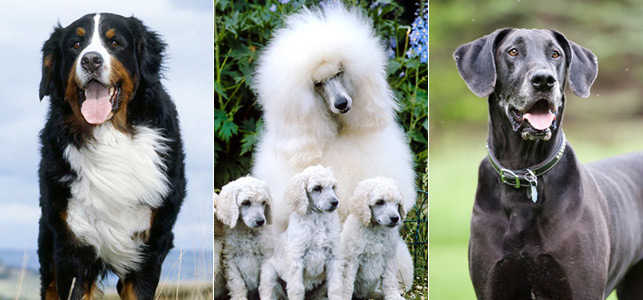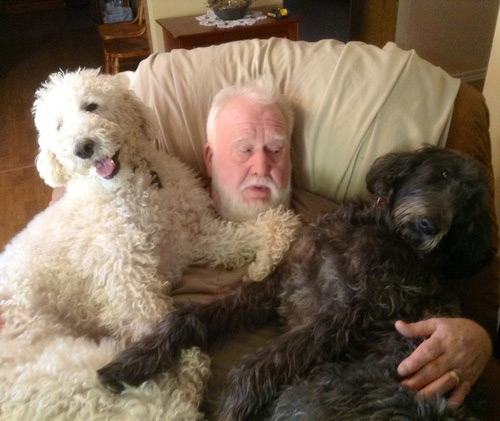5 Common Myths You Shouldn’t Believe About Big Dogs
Published on December 18, 2014
Skip To

1. Big Dogs Are More Aggressive
A fear of large dogs is very common. We bet that you (or someone you know) are more afraid of big dogs than smaller breeds. And although we understand how their stature alone can be intimidating, it’s generally not true that large dogs are more aggressive than their smaller counterparts. Spend an hour with a loving Newfoundland or a sweet Leonberger, and you’ll undoubtedly see that many large and giant breeds tend to be big softies.2. They Can Run Long Distances With No Trouble
Big dogs seem like they’d be more sporty than smaller canines, but there’s a lot more to it than that. Running is a high-impact activity that can aggravate certain orthopedic conditions, including hip dysplasia, which is most common in large and giant breeds. No puppy, no matter the size, can start marathon training the day he gets home, but because large and giant breeds can be more susceptible to developmental orthopedic conditions than smaller dogs, your vet may recommend that you feed your large-breed puppy a special diet to control his skeletal growth rate and wait longer than with a smaller breed to begin running with your big dog.If you’re searching for a running partner, smaller dogs may have an advantage, because they carry less weight and therefore experience less stress on their joints. We’re not saying to completely leave large dogs out of your workout routine — every dog needs exercise — but talk with your veterinarian about what kind of exercise (and how much) is best for your individual dog.
3. Big Dogs Can’t Live in Apartments
Every big dog needs a big space to live in, right? Not exactly. This misconception is so common that Dr. Marty Becker wrote an entire column on keeping big dogs in apartments. Here’s what you should know: Almost any dog can be happy living in any home as long as her exercise needs are satisfied.That comes with caveats, of course, but even dogs like Greyhounds — whom many people think of as needing lots and lots of space to run — can often be content to get their exercise and then curl up on the sofa for the rest of the day. Some Mastiffs can even make good apartment dogs, as long as you’ll never be in the situation of having to carry one up to a fourth-floor walk-up.
4. Big Dogs Are Bad Choices for Homes With Children
When looking for a dog who would get along well with kids, consider that personality may carry more weight than size alone. It is true that some of the more massive breeds, like Irish Wolfhounds and Great Danes, can clear a Candy Land board with the swipe of a tail or accidentally knock over small children during rambunctious play. (That concern goes both ways, however; some children play too rough for small, fragile breeds.) But big dogs can be fantastic playmates and lifelong best friends for children, as long as both species are taught to interact safely and play is always supervised.5. Big Dogs Can’t Be Lap Dogs
A picture is worth a thousand words, so we’ll just leave you with this.
- 5 Small Dog Breed Myths
- 13 Largest Dogs That Are Very Commanding
- 9 Large Breeds That Are Great Family Dogs





